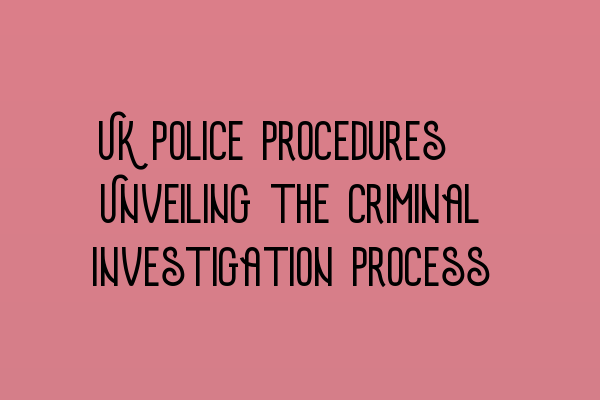UK Police Procedures: Unveiling the Criminal Investigation Process
Welcome to the SQE Criminal Law & Practice Law UK blog! In this article, we will provide you with an in-depth understanding of the criminal investigation process in the United Kingdom. Whether you are a law student preparing for the SQE exams or a legal professional eager to refresh your knowledge, this comprehensive guide will offer you valuable insights.
Understanding the Criminal Investigation Process
The criminal investigation process is a crucial aspect of the UK criminal justice system. It involves several stages and procedures carried out by law enforcement agencies to gather evidence, identify suspects, and ensure a fair trial. Let’s delve into each step of this intricate process:
1. Reporting the Crime
Every criminal investigation begins with the reporting of a crime. This can occur through various channels, including emergency phone calls, online reporting systems, or by visiting a police station in person. Promptly reporting a crime is essential for the timely initiation of the investigation.
As an aspiring criminal law practitioner, it’s crucial to understand the importance of accurate and comprehensive crime reporting. This initial step sets the foundation for the entire investigation.
Want to test your knowledge of criminal law? Check out our SQE 1 Practice Exam Questions to challenge yourself!
2. Assessing the Information
Once a crime is reported, the police assess the information provided to determine the appropriate response. This involves evaluating the severity and nature of the offense, gathering initial evidence, and deciding whether a full investigation is necessary.
The assessment stage plays a critical role in prioritizing cases and allocating resources effectively. It helps ensure that investigations are focused on crimes where there is a realistic chance of identifying and apprehending the offenders.
3. Investigative Strategies
After the initial assessment, the police will develop investigative strategies to gather evidence and narrow down possible suspects. This may involve conducting interviews, examining crime scenes, reviewing CCTV footage, and collaborating with forensic experts.
By employing the appropriate investigative techniques, law enforcement agencies aim to gather as much relevant evidence as possible, which will be decisive during the trial stage.
Looking to improve your criminal law expertise? Explore our range of SQE 2 Preparation Courses tailored to help you succeed!
4. Arrest and Detention
If the investigation leads to the identification of a suspect, the police have the power to arrest and detain them. The arrest process involves informing the suspect of their rights, including the right to legal representation.
During detention, the police can question the suspect under caution. This is done to gather further evidence and obtain a full understanding of the suspect’s involvement in the alleged crime. It’s important to note that the suspect has the right to remain silent and seek legal advice.
For aspiring solicitors, it is crucial to familiarize themselves with the intricacies of arrest and detention procedures. Our SQE 1 Practice Mocks FLK1 FLK2 can provide you with practical scenarios to enhance your understanding.
5. Charge or Release
Following the arrest and questioning, the police will make a decision whether to charge the suspect or release them. This decision is based on the evidence gathered during the investigation and in consultation with the Crown Prosecution Service (CPS).
If there is sufficient evidence to support a charge, the suspect will be formally charged with the specific offense. If not, the individual will be released without charge.
It’s crucial for legal practitioners to stay updated on the latest SRA SQE Exam Dates to ensure they are fully prepared for their licensing exams.
6. Case Preparation for Trial
If the suspect is charged, the case preparation for trial commences. This involves collecting further evidence, identifying and interviewing witnesses, and engaging with relevant experts to strengthen the prosecution’s case.
Legal professionals play a crucial role in assisting and advising their clients during this stage. In-depth knowledge of criminal law and effective case preparation skills are essential for ensuring a fair and robust trial.
Ready to take your criminal law skills to the next level? Enroll in our comprehensive SQE 1 Preparation Courses designed to equip you with the necessary knowledge and expertise.
7. Trial and Verdict
The trial is the culmination of the criminal investigation process. It involves presenting the evidence, cross-examining witnesses, and making legal arguments to establish guilt or innocence. The judge or jury then delivers the verdict.
Successful criminal law practitioners possess excellent advocacy and analytical skills, enabling them to effectively represent their clients in court. Continuous learning and practice are key to honing these skills.
In conclusion, understanding the criminal investigation process is essential for aspiring solicitors and legal professionals in the UK. By familiarizing themselves with the intricacies of each stage, they can navigate the complexities of criminal law successfully.
We hope you found this article informative and useful! For further insights into the SQE exams and criminal law practice, check out our related articles above. If you have any questions or need assistance with your legal education, feel free to contact us. Happy studying!
